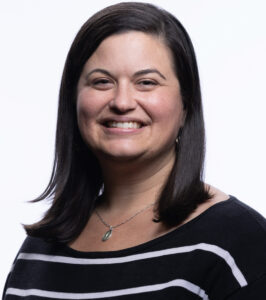
By Gretchen R. Crowe
OSV News Guest Commentary
About 15 years ago, a co-worker at the newspaper of the Diocese of Arlington, Virginia, where I worked for many years, moved to New York. She had discerned a call to the Sisters of Life; that required, naturally, some big life changes.
Among the loose ends she needed to tie up was to find someone to fill her slot for Eucharistic adoration at 6 a.m. on Fridays at the nearby perpetual adoration chapel. Now, I am far from what you would call a morning person. But the chapel was literally across the street from my house, and I felt a tug to give my own little fiat to this weekly commitment. And while it sounds like hyperbole, doing so changed my life.
For an hour a week, I sat tête-à-tête with Our Lord in what amounted to a bit of a discernment showdown of my own: What do you want of me, Lord? Is this all there is to life? How can I serve you in the way that you desire?
The fruits that came from that regular visit were undeniable — peace, direction, clarity, further commitment to my faith. That early morning Holy Hour became a lifeline and helped propel me to be able to give bigger yeses to the Lord as he requested them of me.
When in formation for becoming a Pauline Cooperator with the Pauline Family, I was fascinated and delighted to discover that the Pauline life itself was born of a time of prayer (a Visit) during Eucharistic adoration by our founder, Blessed James Alberione, at midnight on New Year’s Eve 1900-01. “From the tabernacle, everything; without the tabernacle, nothing,” Alberione wrote.
In what has fast become my go-to meditation during adoration today, he continued, “The Visit is a meeting of our soul and of our whole being with Jesus. It is the creature meeting the Creator; the disciple before the Divine Master; the patient with the Doctor of souls; the poor one appealing to the Rich One; the thirsty one drinking at the Font; the weak before the Almighty; the tempted seeking a sure Refuge; the blind person searching for the Light; the friend who goes to the True Friend; the lost sheep sought by the Divine Shepherd; the wayward heart who finds the Way; the unenlightened one who finds Wisdom; the bride who finds the Spouse of the soul; the ‘nothing’ who finds the All; the afflicted who finds the Consoler; the seeker who finds life’s meaning. It is the shepherds at the crib, Mary Magdalene at Simon’s house, Nicodemus who comes by night. It is the holy discussions of the Samaritan woman, of Zacchaeus, of Philip, and of the Apostles with Jesus; especially in the last week of His earthly life and after the resurrection.”
No matter how we come to him, his arms are open wide to receive us.
Pope Francis, in a recent meeting with representatives from the National Eucharistic Revival and Congress, expressed his sorrow that many people “have lost the sense of adoration.” This sense, he said, this “real and loving presence of the Lord,” needs to be regained. “It is a prayer we have lost; few people know what this is, and (the) bishops need to catechize the faithful on the prayer of adoration,” he said.
The bishops seem to be taking their role seriously. Bishop Andrew Cozzens of Crookston, Minnesota, one of the primary leaders of the National Eucharistic Revival, told members of the Catholic Media Association in Baltimore in early June that, since the bishops had started the revival, they have made a point to have adoration throughout the night during their spring and fall plenaries. “It’s been very powerful,” he said. “This is where revival starts. It starts in our hearts.”
It does start in our hearts — each of ours. It starts with that first yes; that first visit; those first moments in silence before the monstrance or the tabernacle, where the Lord begins his work on us.
- - -
Gretchen R. Crowe is editor-in-chief for OSV News.
